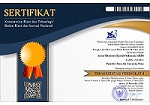Analisis Faktor-Faktor Yang Mempengaruhi Akuntabilitas &Transparansi Informasi Keuangan Daerah Melalui Website
Abstract
Abstracts : This research aims to find new evidence, the factors that affect the accountability and transparency of financial information via the website area. With the rules and regulations related to the disclosure of public information, as the practice of good governance, all government units are obliged to submit financial information to the public in a transparent manner. One media delivery of such information is through the website. Based on a review of literature and previous research, we use the seven factors suspected to affect the accountabilitty and transparency of financial information via the website area, the factors are the ratio of PAD, the size of the local government, the complexity of the administration, the ratio of debt financing, shopping areas, the level of welfare and quality of financial reporting area. In this study, researchers used the several districts government and cities in Indonesia, and run two test models are logistic regression and multiple linear regression. The results showed that the only factor which the level of welfare significant positive effect on the transparency of financial information via the website regions, whereas other factors had no significant effect. This indicates that the public welfare, which implies the use of Internet media to access the area of financial information. These results imply that the presentation of financial information based pressure area information needs of the community have access to the internet, that people who are already good level of welfare.
Full Text:
PDFReferences
DAFTAR PUSTAKA
Baber, W.R. (1983). Towards understanding the role of Auditing in the public sector. Journal of Accounting and Economics 5 (3), 213–227.
Banker, R.D., Patton, J.M. (1987). Analytical agency theory and municipal accounting: An introduction and an application. Research in Governmental and Nonprofit Accounting 3 (Part B), 29–50.
Burritt, R. L. & Schaltegger, S. (2010). Sustainability accounting and reporting: fad or trend?, Accounting, Auditing & Accountability Journal, 23(7), 829-846, doi: http://dx.doi.org/10.1108/09513571011080144.
Christiaens, J. (1999). Financial accounting reform in Flemish municipalities: Anempiricalinvestigation. Financial Accountability and Management 15 (1), 21–40.
Craven, B., Marston, C. (1999).Financial reporting on the internet by leading UK companies.The European Accounting Review 8(2), 321-333.
Debrency, R., Gray, G. L., & Rahman, A. (2002). The determinants of internet financial reporting.
Journal of Accounting and Public Policy Vol 2, 371-394.
Escobar, T., & Bonson, E. (2005). A survey on voluntary disclosure on the internet: Empirical evidence from European Union companies. The International Journal of Digital Accounting Research Vol 2, 27-51.
Ettredge, M., Richardson, V.J., Scholz, S. (2002). Dissemination of information for investors atcorporate websites. Journal of Accounting and Public Policy 21 (4/5), 357–369.
Ghozali, I. (2013). Aplikasi Analisis Multivariate dengan Program IBM SPSS 21. Semarang: Universitas Diponegoro.
Godfrey, Jayne et al. (2010). Accounting Theory 7th Edition. Jakarta: John Wiley.
Gujarati, D. N. (2003). Basic econometrics. New York: Mc Graw Hill.
Guthrie, J. (1998). Application of accrual accounting in Australian public sector: rhetoric or reality?, Financial accounting and management, vol14, no1, pp1-19.
Hair, J. F., Black, W. C., Babin, B. J., & Anderson, R. E. (2009). Multivariate Data Analysis. Pearson New International Edition.
Harun, H., & Kamase, H. P. (2012). Accounting Change and Institutional Capacity: The Case of a Provincial Government in Indonesia. AABFJ.
Indriantoro, N., & Supomo, B. (1999). Metodologi Penelitian Bisnis. Yogyakarta: Fakultas Ekonomika & Bisnis UGM.
Jensen, M., & Meckling, W. (1976). Theory of the firm: managerial behavior, agency costs, and ownership structure. Journal of Financial Economics.
Lapsley, I & Pallot, J. (2000). Accounting, management and organizational change: a comparative study of local government. Management Accounting Research, vol.11, p213-22.
Laswad, F., Fisher, R., & Oyelere, P. (2005). Determinants of voluntary Internet financial reporting by local government authorities. ELSEVIER.
Liestiani, A. (2008). Pengungkapan LKPD Kab/Kota di Indonesia untuk Tahun Anggaran 2006.
Universitas Indonesia.
Marston, C., & Polei, A. (2005). Corporate reporting on the internet by German companies. International Journal of Accounting Information Systems Vol 5, 285-311.
Martani, D., Fitriasari, D., & Annisa. (2014). Financial and performance transparency on the local government websites in indonesia. Journal of Theoretical and Applied Information Technology.
Martinsen, D. S. & Beg Jørgensen T. (2010). Accountability as a differentiated value in supranational governance, The American Review of Public Administration, 40(6), pp. 742–760, doi: 10.1177/0275074010366300.
Indra, F. (2012). Faktor-faktor yang mempengaruhi transparansi informasi keuangan pada situs resmi pemerintah daerah di indonesia. Depok: Universitas Indonesia.
Munoz, L. A., & Bolivar, M. P. (2015). Determining Factors of Transparency and Accountability in Local Governments: A Meta Analytic Study. Lex Localis.
Perez, C. C., Hernandez, A. M., & Bolivar, M. P. (2005). Citizens’ access to on-line governmental financial information: Practices in the European Union countries . ELSEVIER.
Pitman, M. K., & Groff, J. E. (2004). Municipal Financial Reporting on the World Wide Web: A Survey of Financial Data Displayed on The Official Websites of The 100 Largest U.S Municipalities. Journal of Government Financial Management.
Puspita, Rora., Dwi Martani. (2012). Factors Influencing The Level of Vountary Disclosure on Government Websites in 2010. Paper presented in Simposium Nasional Akuntansi 15, Balikpapan, 20-21 September 2012.
Puspita, R., & Martani, D. (2012). Analisis pengaruh kinerja dan karakteristik pemda terhadap tingkat pengungkapan dan kualitas informasi dalam website pemda. Universitas Indonesia.
Ryan, C. (1999). Australian public sector financial reporting: a case of cooperative policy formulation,
Accounting, Auditing and Accountability Journal, vol. 12, no. 5, pp561- 582.
Sanchez, I. M., Aceituno, J. V., & Dominguez, L. R. (2012). Determinants of corporate social disclosure in Spanish local governments. ELSEVIER.
Sisdyani, E. A., & Jaya, J. D. (2014). Pengaruh Pendapatan Asli Daerah, Dana Alokasi Umum, dan Belanja Modal pada Kelengkapan Informasi Keuangan Daerah Melalui Situs Resmi Pemerintah Provinsi Bali. Universitas Udayana.
Styles, A. K., & Tennyson, M. (2007). The accessibility of financial reporting of u.s municipalities on the internet. Journal of Public Budgeting, Accounting & Financial Management.
Sugiyono. (2007). Metode Penelitian Bisnis. Bandung: Alfabeta.
Thornton, J. B., & Thornton, E. (2013). Assessing state government financial transparency websites.
Emerald Insight.
Trisnawati, Mya Dewi & Achmad, Komarudin. (2013). Determinan Publikasi Laporan Keuangan Pemerintah Daerah Melalui Internet. Malang, Universitas Brawijaya.
West, D. M. (2005). Digital government, technology, and public sector performance. Princeton NJ: Princeton University Press.
Zimmerman, L. J. (1977). The municipal accounting maze: An analysis of political incentives. Journal of Accounting Research Vol 15, 107-144.
Undang-Undang Republik Indonesia Nomor 34 Tahun 2000 tentang Pajak Daerah dan Retribusi Daerah.
Undang-Undang Republik Indonesia Nomor 32 Tahun 2004 tentang Pemerintahan Daerah.
Undang-Undang Republik Indonesia No. 14 Tahun 2008 tentang Keterbukaan Informasi Publik Peraturan Pemerintah Republik Indonesia Nomor 3 Tahun 2007 tentang Laporan penyelenggaraan pemerintahan daerah kepada pemerintah, laporan keterangan pertanggungjawaban kepala daerah kepada dewan perwakilan daerah, dan informasi laporan penyelenggaraan pemerintahan daerah kepada masyarakat.
Peraturan Pemerintah Republik Indonesia Nomor 7A Tahun 2007 tentang Tatacara penyampaian informasi dan tanggapan atau saran dari masyarakat atas laporan penyelenggaraan pemerintahan daerah.
Peraturan Pemerintah Republik Indonesia Nomor 6 Tahun 2008 tentang Pedoman evaluasi penyelenggaraan pemerintahan daerah kepada masyarakat.
Peraturan Pemerintah No. 65 Tahun 2010 tentang Perubahan atas Peraturan Pemerintah No. 56 tahun 2005 tentang Sistem Informasi Keuangan Daerah.
Instruksi Presiden No. 3 Tahun 2003 tentang Kebijakan dan Strategi Nasional Pengembangan e-government
Instruksi Mendagri No. 188.52/1797/SJ Tahun 2012 mengenai Transparansi Anggaran Daerah
DOI: http://dx.doi.org/10.21927/jesi.2017.7(1).61-78












